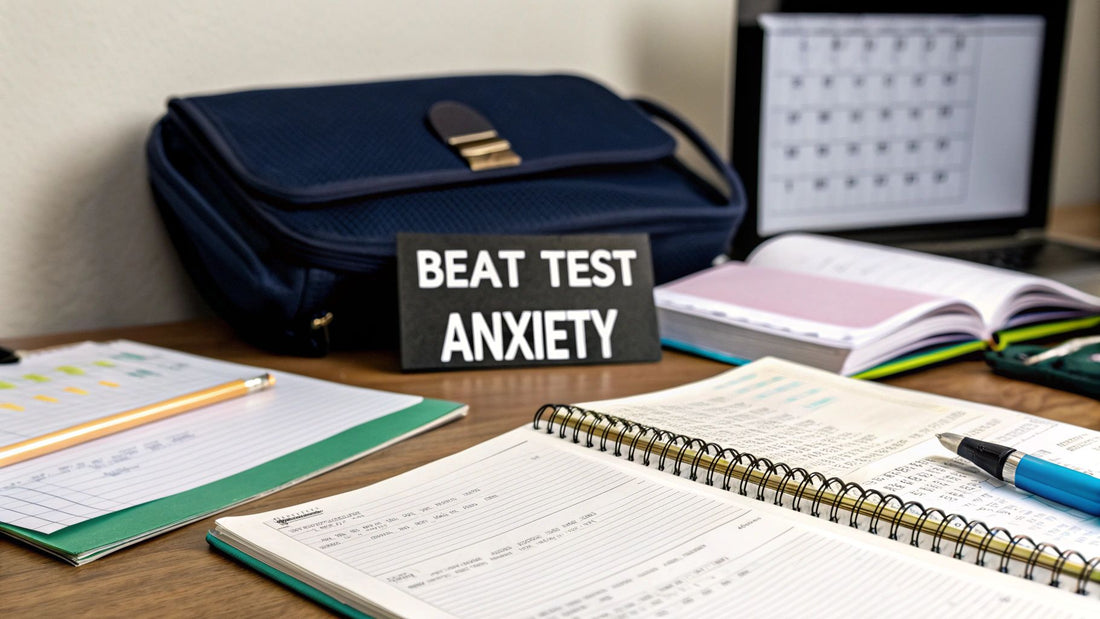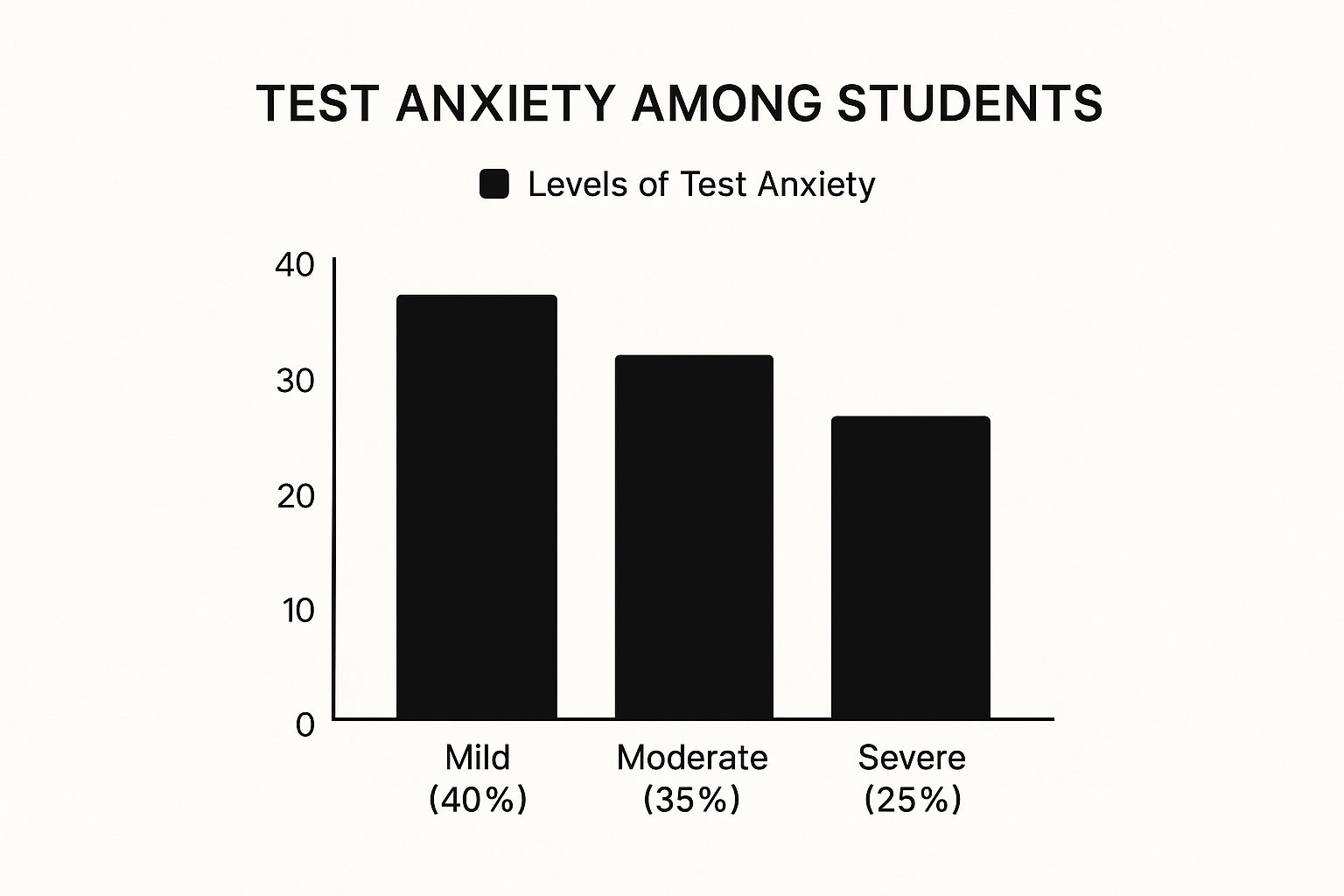
How to Handle Test Anxiety: Top Tips for UK Students
Share
Tackling test anxiety starts with recognising what it actually is – physically and emotionally. It's so much more than just "exam nerves." The first step is to pinpoint your specific triggers, whether it's that racing heart or a flood of negative thoughts. Once you know what you're up against, you can start using targeted techniques to get back in the driving seat.
Understanding What Test Anxiety Really Feels Like
Let's be honest, the pressure on students in the UK right now is huge. Test anxiety isn't just about feeling a bit jittery before walking into the exam hall; it’s a powerful wave of stress that can completely cloud your thinking and stop you from performing your best.
It's that tight knot in your stomach. The heart-thumping-in-your-chest feeling. Or that sudden, overwhelming urge to deep-clean your entire bedroom when you know you should be revising.
This intense pressure shows up in different ways. You might get physical signs like sweaty palms, a dry mouth, or feeling sick. Emotionally, it can feel like a constant sense of dread, finding yourself irritable with everyone, or being crushed by self-doubt. Behaviourally, it's the classic procrastination, the trouble sleeping, or that awful mind-blank moment where you stare at a question you knew the answer to just an hour ago.
The Rising Tide of Exam Stress
If this sounds familiar, it's so important to realise you are not alone. Exam anxiety has become incredibly common among young people across the UK. The big shift towards high-stakes final exams, moving away from coursework, has dialled the pressure way up. One in six children aged 5-16 in the UK are identified as having a probable mental health problem, a figure that highlights the importance of addressing these issues early.
Before the pandemic, studies showed around 25% of students reported feeling exam anxiety. That figure has shot up since. Recent data from the British Psychological Society reveals that post-COVID, this has climbed to nearly 40% among female students. You can read the full analysis of the data on exam anxiety to get a sense of just how widespread this has become.

As you can see, while most students experience a milder form of anxiety, a really significant number are dealing with moderate to severe levels that can seriously get in the way of their performance and general well-being. The cost of poor mental health isn't just personal; Deloitte estimates it costs UK employers up to £56 billion a year. Addressing mental health in young people is an investment in our future workforce.
To make it a bit easier to spot, here's a quick rundown of the common signs.
Recognising the Signs of Test Anxiety
It can be really helpful to see the symptoms laid out clearly. This table breaks down the common physical, emotional, and behavioural clues that test anxiety might be affecting you or someone you know.
| Physical Signs | Emotional Signs | Behavioural Signs |
|---|---|---|
| Racing heart or palpitations | Feeling of dread or fear | Procrastinating or avoiding revision |
| Sweating or feeling clammy | Irritability or mood swings | Fidgeting or restlessness |
| Headaches or migraines | Feelings of hopelessness | Trouble sleeping or changes in sleep patterns |
| Nausea or an upset stomach | Difficulty concentrating | "Blanking out" during the test |
| Dry mouth | Overwhelming self-doubt | Biting nails or other nervous habits |
| Shortness of breath | Feeling helpless or powerless | Changes in eating habits (more or less) |
Recognising these signs in yourself is the first, most powerful step you can take. By understanding what's happening in your mind and body, you can start to learn how to manage these feelings before they take control.
Important Disclaimer: Please remember, I am not a mental health professional. This guide is designed to offer supportive advice and practical strategies. If your anxiety feels overwhelming or is impacting your daily life, it is essential to seek professional help. Your GP is the best first point of contact, and they can guide you towards the right support.
Effective Revision Strategies to Reduce Anxiety
Telling someone with test anxiety to "just study more" is some of the worst advice you can give. In fact, unstructured, last-minute cramming can pour fuel on the anxiety fire. The secret isn't about locking yourself away for more hours, but about smarter, calmer preparation that genuinely builds confidence. It's about proving to your own brain that you're capable.
Think of a good revision plan as your first line of defence against the chaos of anxiety. It puts you back in the driving seat. Instead of facing a terrifying mountain of work, you're just taking a series of small, manageable steps.
Start by mapping out all your subjects and topics. For example, if you're revising for a Biology exam, don't just write "Biology" on your calendar. Break it down into "Cell Structure," "Photosynthesis," and "Genetics." Then, grab a calendar and be honest with yourself. Scheduling eight hours of solid revision is a recipe for burnout, not success. A much better approach is to plan focused sessions with proper rest periods built right in.
Structure Your Study Time for Success
The way you structure your study sessions can make a huge difference to both your memory and your anxiety levels. Endless cramming is far less effective than shorter, sharper bursts of work.
One of the best methods is to break your time into manageable chunks. Give this a try:
- 45 minutes of focused study: Put your phone in another room, close all the irrelevant tabs, and give one topic your full attention.
- 15 minutes of a screen-free break: This is absolutely crucial. Don't just switch from your textbooks to TikTok. Get up, stretch, grab a drink, look out of the window, or listen to a song. For example, you could do 10 minutes of gentle stretching or make a cup of tea. This downtime lets your brain actually process and store what you’ve just learned.
This structured approach stops your brain from getting tired and helps information sink in properly, which is a massive confidence booster.
Work Smarter with Active Revision
Passive revision, like re-reading your notes or highlighting a textbook, can give you a false sense of security. You feel like you're doing something productive, but the information isn't really sticking. To truly beat that awful "mind blank" feeling in an exam, you need to use active recall and spaced repetition.
Active recall is all about pulling information out of your brain, rather than just passively putting it in. You could:
- Use flashcards to test yourself (or get someone to test you).
- Try to explain a concept out loud to a family member or friend. For instance, try explaining the causes of World War I to your sibling in your own words.
- Create spider diagrams or mind maps from memory, then check them against your notes.
Spaced repetition means reviewing information at increasing intervals. So, instead of cramming a topic all in one go, you might review it after a day, then a few days later, and then a week after that. This process signals to your brain that this information is important, helping to lock it into your long-term memory.
By actively proving to yourself that you can remember information under low-stress conditions, you build a mental library of evidence that you do know your stuff. This is a powerful weapon against the negative self-talk that fuels test anxiety.
Taming the Exam Environment
A huge part of exam fear comes from the unknown. The formal exam hall, the ticking clock, the deafening silence—it can all feel incredibly intimidating. The good news is you can reduce this fear by recreating the experience at home.
Set aside time to do past papers under strict, timed conditions. No phone, no notes, no distractions. Just you, the paper, and the clock. The first time you do this, it will probably feel stressful. But the more you practise, the less daunting the real thing will seem. You're building familiarity and resilience. For more on this, you might find our guide on how to build emotional resilience useful.
Finally, never underestimate the basics. Getting enough sleep isn't a luxury during revision; it's essential for cementing memories. Eating balanced meals and staying hydrated will keep your brain fuelled, and even a short walk can clear your head and lower stress hormones. Look after your body, and your brain will thank you for it.
Proven Mental Techniques to Calm Your Mind
Your mindset is one of your most powerful tools when it comes to handling test anxiety. Beyond revision strategies, there are mental exercises that can give you immediate relief and help you build long-term resilience. Best of all, you can use these techniques anywhere, from your revision desk to the exam hall itself.

If you're feeling the pressure, you're definitely not alone. This feeling is incredibly widespread. A recent survey found a staggering 85% of UK students experience exam anxiety. What’s more, it’s estimated that around 15% suffer from high test anxiety during their GCSEs.
With 62% of students feeling they don’t get enough mental health support from schools, it's clear just how vital it is to develop your own coping skills.
Challenge Your Negative Thoughts
Anxious thoughts often pop up as a critical inner voice, telling you you’re going to fail or that you haven't prepared enough. The trick isn’t to ignore this voice, but to challenge it with a bit of logic and evidence.
Instead of just accepting a thought like, "I'm definitely going to fail this exam," press pause and reframe it. Try replacing it with something more balanced and realistic, such as, "I've prepared for this, and I'm going to do the best I can with what I know." This small shift can be enough to stop a negative spiral in its tracks.
This technique is sometimes called cognitive reframing. It's all about changing your perspective. You’re not pretending everything is perfect; you're just shifting from a catastrophic viewpoint to one that feels more manageable.
Master Calming Breathing Exercises
When panic starts to set in, your breathing often becomes shallow and rapid, which only makes the physical symptoms of anxiety feel worse. A simple breathing exercise can quickly calm your nervous system right down and bring you back to a state of focus. Other simple relaxation tips include progressive muscle relaxation (tensing and then releasing muscle groups one by one) or spending time in nature.
One of the most effective and discreet methods is box breathing:
- Breathe in slowly through your nose for a count of four.
- Hold your breath for a count of four.
- Breathe out slowly through your mouth for a count of four.
- Hold your breath again for a count of four before repeating.
Practice this for just a few minutes whenever you feel that stress rising. It’s a simple but incredibly powerful tool for regaining control.
Navigate the Impact of Social Media
It’s also really important to be mindful of external pressures, especially from social media. The "studygram" culture, while it can be motivating for some, often creates a damaging cycle of comparison. Seeing perfectly organised notes and flawless revision timetables can easily make you feel inadequate and dial up your anxiety. Research has shown a link between high social media use and increased anxiety and depression in young people.
Try to set some boundaries for yourself. This might mean unfollowing accounts that make you feel stressed, limiting your time on certain apps during revision periods, or simply reminding yourself that what you see online is a curated highlight reel, not the full reality.
Beyond just understanding the feeling, taking practical steps is essential. For a broader range of actionable strategies, it's worth exploring how to learn to effectively overcome test anxiety.
Your Game Plan for Exam Day

After all the hard work, the day of the exam can feel like the final boss battle. It’s where everything comes together. Having a solid plan for the day itself can make a world of difference, taking the fear out of the unknown and handing you back a sense of control.
Your game plan starts the moment your alarm goes off. Frantically cramming last-minute facts or rushing around in a panic is a sure-fire way to send your anxiety through the roof. What you need is a calm, deliberate morning routine.
This means waking up with plenty of time to spare so you don’t feel rushed. It also means fuelling your brain properly. Go for a balanced breakfast with some protein and whole grains to keep your energy levels steady. For example, porridge with berries or scrambled eggs on wholemeal toast. Steer clear of sugary cereals or too much caffeine, which can lead to a nasty energy crash and make you feel even more jittery.
Before You Go In
The moments right before you walk into the exam hall are critical. What you do here can set the tone for the entire test, helping to ground you and quieten that anxious inner voice.
Here are a few simple things I’ve seen work wonders:
- A calming playlist: Put together a short playlist of songs that make you feel confident and relaxed. Listening on the way can be a great way to block out any negative chatter in your head.
- Avoid the pre-exam panic: Try to steer clear of classmates who are frantically quizzing each other. This kind of last-minute cramming rarely helps and often just reminds you of things you think you've forgotten, spiking your anxiety.
- A quick grounding exercise: Wherever you are, take a second to plant your feet firmly on the ground. Really focus on that feeling of the floor beneath you and take a few slow, deep breaths, just like you’ve practised.
Remember, the goal here is to trust your preparation. You've put in the hours. The few minutes before the exam are for calming your mind, not cramming more information into it.
Inside the Exam Hall
Once you’re sitting at your desk, the pressure can feel immense. Again, having a clear process is your best defence. Don't just dive headfirst into the first question. Take a breath and get your bearings.
First, take a minute to read through the entire paper. This gives you a bird's-eye view of what’s ahead and helps you plan your time. Knowing the full layout of the exam reduces the chance of any nasty surprises cropping up later on.
If you feel a wave of panic rising mid-exam, use this simple 3-step reset to get back on track:
- Stop: Put your pen down. Just for a moment.
- Breathe: Take three slow, deliberate breaths. That box breathing technique we talked about is perfect for this.
- Refocus: Find a question you know you can answer and start there. It’s a great way to rebuild your confidence and get back into the flow.
How to Build Your Support System

Navigating test anxiety isn't something anyone should have to do alone. In fact, building a solid support system is one of the most powerful ways to manage the pressure, turning what feels like a lonely struggle into a real team effort. This support can come from parents, friends, and trusted adults at school.
The key is opening up a conversation. I know, that’s often the hardest step.
Recent data on UK students really highlights a silent struggle: while 85% experience anxiety related to exams, a staggering 71% don't seek any help at all. A significant 70% chose not to access support for their stress, which shows just how vital it is for schools and families to proactively create safe spaces for these discussions. You can discover more insights about the student anxiety data to understand the full scale of the issue.
Advice for Parents and Guardians
As a parent, your first instinct is to help, but it can be tricky to do that without accidentally adding more pressure. One of the best things you can do is shift your focus from results to effort. Praising the hard work and resilience they show during revision—regardless of the final grade—builds genuine, lasting confidence.
Here are a few practical ways you can offer support:
- Listen without judgement. Create a space where they can talk about their fears without being told to "just stop worrying." Sometimes, just getting it out is half the battle.
- Encourage proper breaks. Suggest screen-free downtime, like going for a walk, listening to some music, or watching a film together. Anything to help them properly switch off.
- Help with the logistics. Offer practical help like making them healthy snacks or ensuring they have a quiet, organised place to revise. Taking small tasks off their plate can make a big difference.
Advice for Students
Reaching out can feel incredibly daunting, but I promise you, it’s a sign of strength, not weakness. If you're struggling, take a moment to think about who you can talk to. This could be a parent, an older sibling, or a trusted friend who just gets it.
You also have options at school. Consider speaking to a favourite teacher, a form tutor, or a school counsellor. They are trained to listen and can offer practical strategies. Just knowing you have an ally at school can make a huge difference. For more guidance, you can also explore these mental health resources for teens.
Remember, you don’t have to have all the answers before you speak to someone. Simply saying, "I'm feeling really overwhelmed by my exams, and I don't know what to do," is a perfect place to start.
Normalising the Conversation
The more we talk openly about mental health, the better it is for everyone. It breaks down the stigma that stops people from asking for help when they need it most.
This is why you might see more things like mental health apparel or open discussions online – they are all small but important steps in making it okay to not be okay. Wearing a hoodie with a positive mental health message, for example, can be a conversation starter. Similarly, reading mental health books can provide comfort and new perspectives, helping young people feel less alone in their experiences.
A Few Final Questions Answered
When you're dealing with the pressure cooker of exam season, it's natural for questions to pop up. Here are some straightforward answers to the things I get asked most often, hopefully offering a bit of extra clarity for students and parents alike.
Is It Normal to Feel a Bit Anxious Before an Exam?
Absolutely. In fact, a little bit of stress before a test can actually be a good thing. It sharpens your focus and gets your mind and body ready for the challenge ahead.
It only becomes a problem when those nerves tip over into full-blown anxiety that stops you from thinking clearly. The goal isn't to get rid of stress entirely—that's impossible! It's about learning to keep it in check so it doesn't get in your way.
What if These Techniques Don't Seem to Be Working?
Everyone is wired differently, so what works wonders for one person might not be the right fit for you. That's completely okay. If you've given these strategies a proper go and your anxiety still feels too big to handle, it's really important to reach out for professional help.
Disclaimer: Just a quick note to say I'm not a mental health professional. This guide is all about offering supportive, practical advice, not medical treatment. Your GP is always the best first port of call. They can listen to what's going on and talk you through the options, which might include a referral to a service like CAMHS (Child and Adolescent Mental Health Services).
Can My Diet Really Make a Difference to My Exam Stress?
Yes, it really can. What you eat has a surprising impact on how you feel.
Starting exam day with a balanced breakfast helps to keep your blood sugar stable, which is crucial for maintaining focus and energy. It's also a good idea to steer clear of high-caffeine and high-sugar drinks, as they can lead to energy crashes and jitters that feel a lot like anxiety symptoms.
Many people also find it helpful to look into how nutrition supports overall mental wellbeing. For those struggling, it might be worth exploring how addressing general anxiety with gut health supplements could be a useful, complementary approach.
How Can I Help a Friend Who's Really Struggling?
The best thing you can be is a good listener. Just being there without judgement can make a huge difference.
Suggest taking revision breaks together, give them space to talk through their worries, and gently remind them of how hard they’ve worked and all their strengths. For example, you could say, "You were brilliant at explaining that chapter to me yesterday, you know this stuff."
Try to avoid phrases like "just calm down," which can feel dismissive. Instead, something like, "I can see this is really tough for you," shows you understand. If you're genuinely worried, the kindest thing you can do is encourage them to talk to a trusted adult – a parent, a teacher, or the school counsellor. Your support could be exactly what they need to take that step.
At Little Fish Books, we create books and resources designed to help young people make sense of their emotions. From engaging activities to gentle, supportive stories, our goal is to nurture emotional well-being and build resilience from a young age. You can explore our collections and find tools to support the young person in your life at https://thatsokay.co.uk.
